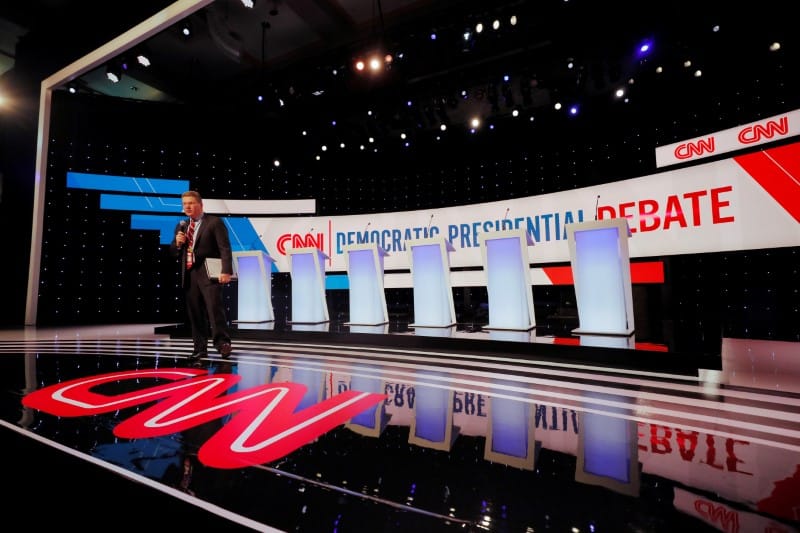Six Democratic White House contenders will take part on Tuesday in a high-stakes Iowa debate, as polls show an unsettled nominating race with no clear favorite three weeks before Iowans kick off the party’s presidential nominating contest.
The seventh debate in the race to find a November challenger to President Donald Trump will be the last face-to-face encounter among the candidates before Iowa’s caucuses on Feb. 3, giving the contenders a final high-profile chance to make their case to voters.
It comes as opinion polls in recent days show an extremely tight race among four candidates – former U.S. Vice President Joe Biden, U.S. Senators Bernie Sanders and Elizabeth Warren, and former Mayor Pete Buttigieg of South Bend, Indiana.
Joining the four in the debate are U.S. Senator Amy Klobuchar and billionaire activist Tom Steyer.
With surveys showing a virtual tie in Iowa and a largely undecided electorate, all candidates will face mounting pressure to make an impression, raising expectations for a contentious evening.
“I envision a much more aggressive debate than we have seen in the past, primarily because the stakes have gotten higher as the calendar has gotten shorter,” said Democratic strategist Chris Kofinis, who worked on John Edwards’ past White House campaign.
It is the first debate since a U.S. air strike killed an Iranian military commander, elevating foreign policy concerns and sparking clashes among Democrats, particularly Biden and Sanders, over the role of U.S. military interventions. That dispute is almost certain to rise again.
Sanders, a longtime antiwar advocate who voted in 2002 against authorizing the Iraq invasion, has repeatedly criticized Biden for his vote as a U.S. senator to authorize the war. Biden, a former chairman of the Senate Foreign Relations Committee, has touted his security credentials.
The campaigns of Sanders and Warren, progressive allies and friends who have refrained from attacking each other, clashed over the weekend over a report that some Sanders campaign volunteers were instructed to describe Warren as a candidate of the elite when talking to voters.
In a further sign of growing tensions between the two, Warren pushed back on Monday against Sanders’ denial of a CNN report that he told her in a 2018 meeting he did not believe a woman could beat Trump in the 2020 election.
The Iowa debate also comes just days before the expected start of a Senate trial to determine if Trump should be removed from office, on charges of abuse of power and obstruction of Congress stemming from his request that Ukraine investigate Biden.
Three of the Democrats in the debate who serve in the Senate – Sanders, Warren and Klobuchar – will sit as jurors in the impeachment trial, giving them an elevated role in the process.
ALL-WHITE DEBATE STAGE
The debate stage will be the least crowded since the debates began in June, with the Democratic National Committee’s toughened polling and fundraising requirements to qualify eliminating other candidates.
Entrepreneur Andrew Yang, an Asian American who participated in last month’s seven-candidate debate, did not make the cut this time, leaving an all-white field of debaters in a party that prides itself on its diversity.
The withdrawal from the race on Monday of U.S. Senator Cory Booker, an African American, leaves only one black candidate, former Massachusetts Governor Deval Patrick, in what had once been the most diverse field of presidential contenders in U.S. history.
The uncrowded stage should help some candidates connect with more voters, giving them a bigger spotlight and more time to explain their views.
Warren, Buttigieg and Klobuchar all need a win or a top-tier showing in Iowa to propel them into the next contests in New Hampshire, Nevada and South Carolina.
Some of the biggest strongholds for Biden and Sanders are in later early voting states – South Carolina for Biden and New Hampshire for Sanders – giving them more of a shot to recover from a poorer-than-expected showing. But a decisive win in Iowa could allow either of them to take control of the race.
“For the candidates who are putting all their chips in Iowa, this might be your last chance. It’s now or never,” said Kelly Dietrich, a Democratic strategist who runs a national training program for political candidates and staff.
The Iowa debate will be the first of four to be held in slightly more than a month as the first four states kick off the voting in February. The next debate will be Feb. 7 in New Hampshire, followed by debates on Feb. 19 in Nevada and Feb. 25 in South Carolina.
(Reporting by John Whitesides; Editing by Soyoung Kim and Peter Cooney)

























 Continue with Google
Continue with Google